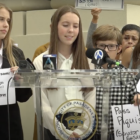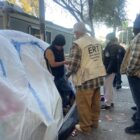Overdose Crisis
2023 Is San Francisco’s Deadliest Year on Record for Drug Overdoses
Last Thursday San Francisco’s chief medical examiner released the city’s updated overdose death count — 752 so far — making 2023 the worst year on record for drug-related fatalities. One-third of those people were listed as having no fixed address. Later that day, a crowd gathered at Civic Center Plaza to remember more than 420 who died in the city while experiencing homelessness this year.










